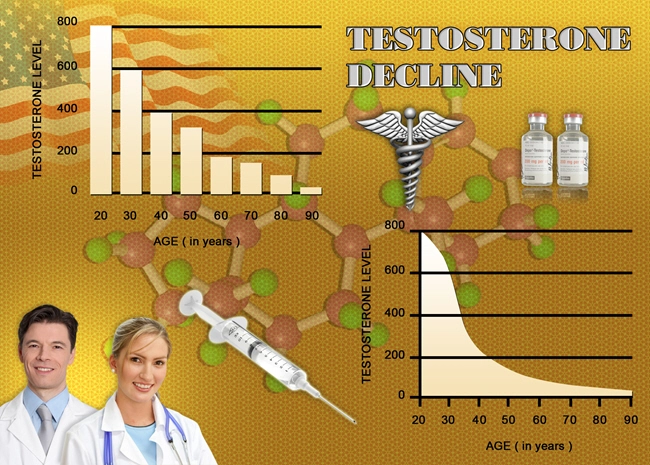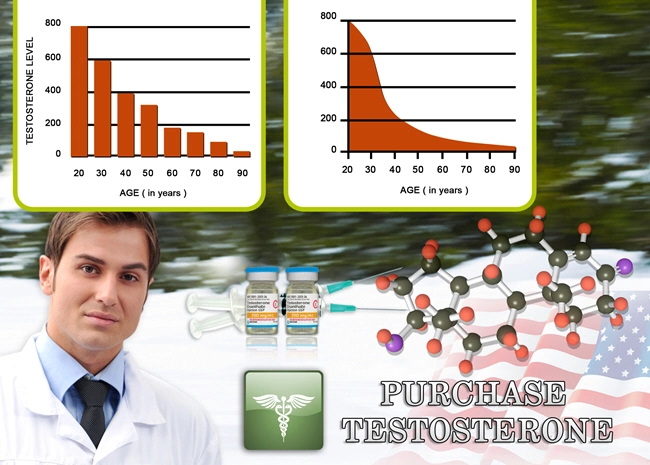
Introduction
Testosterone, a pivotal hormone in male physiology, influences a wide array of bodily functions, including muscle mass, bone density, and libido. Recent advances in genetic research have opened new avenues for understanding how genetic variations impact testosterone levels. This article delves into a groundbreaking genome-wide association study (GWAS) focused on American men, exploring the genetic factors that modulate testosterone levels and their implications for health and disease.
Study Design and Methodology
The study involved a cohort of 10,000 American men aged 20 to 80, selected to represent a diverse genetic background. Researchers utilized high-throughput genotyping arrays to scan the entire genome for single nucleotide polymorphisms (SNPs) associated with serum testosterone levels. The data were then analyzed using advanced statistical models to identify significant genetic variants.
Key Findings on Genetic Variants
The GWAS identified several SNPs significantly associated with testosterone levels. Notably, variants near the SHBG (Sex Hormone-Binding Globulin) gene were found to have a strong correlation with testosterone levels. SHBG binds to testosterone in the blood, affecting its bioavailability. Other significant SNPs were located near genes involved in the hypothalamic-pituitary-gonadal axis, which is crucial for testosterone synthesis and regulation.
Implications for Health and Disease
The genetic insights from this study have profound implications for understanding and managing conditions related to testosterone levels. Low testosterone, or hypogonadism, can lead to decreased muscle mass, increased body fat, and reduced libido. Conversely, excessively high levels of testosterone are linked to increased risks of prostate cancer and cardiovascular diseases. By identifying genetic markers, healthcare providers can better tailor interventions, such as hormone replacement therapy, to individual genetic profiles.
Personalized Medicine and Future Directions
The findings underscore the potential of personalized medicine in managing testosterone levels. By understanding an individual's genetic predisposition, clinicians can predict the likelihood of developing testosterone-related disorders and implement preventive measures. Future research should focus on validating these genetic associations in larger, more diverse populations and exploring the interaction between genetic and environmental factors.
Challenges and Considerations
While the study provides valuable insights, it is not without limitations. The genetic associations identified explain only a fraction of the variance in testosterone levels, suggesting that environmental factors and gene-environment interactions also play significant roles. Additionally, the study's findings need to be replicated in other populations to ensure their generalizability.
Conclusion
This genome-wide association study marks a significant step forward in understanding the genetic underpinnings of testosterone levels in American men. The identified genetic variants offer new pathways for research and clinical practice, potentially leading to more effective, personalized treatments for testosterone-related disorders. As the field of genetic research continues to evolve, it holds the promise of revolutionizing our approach to men's health.
By integrating genetic insights with clinical practice, we can enhance our ability to manage and treat conditions affected by testosterone levels, ultimately improving the health and well-being of American men.
Contact Us Today For A Free Consultation
Dear Patient,
Once you have completing the above contact form, for security purposes and confirmation, please confirm your information by calling us.
Please call now: 1-800-380-5339.
Welcoming You To Our Clinic, Professor Tom Henderson.

- Unlocking the Potential of Testosterone: A Glimpse into Future Hormonal Health for American Males [Last Updated On: February 24th, 2025] [Originally Added On: February 24th, 2025]
- Chanelling Inner Strength: Harnessing Testosterone, The Elixir of Masculinity [Last Updated On: February 25th, 2025] [Originally Added On: February 25th, 2025]
- Understanding the Hormonal Conductor: The Formative Influence of Testosterone on Life [Last Updated On: February 26th, 2025] [Originally Added On: February 26th, 2025]
- The Unmasking Saga: Tracing Testosterone's Evolutionary Path [Last Updated On: February 27th, 2025] [Originally Added On: February 27th, 2025]
- Genetics and Testosterone Levels: Insights for American Males [Last Updated On: February 27th, 2025] [Originally Added On: February 27th, 2025]
- Unveiling Masculine Eminence: The Untold Advantages of Optimal Testosterone Levels [Last Updated On: February 28th, 2025] [Originally Added On: February 28th, 2025]
- Decoding Testosterone: Distinguishing Truth From Tall Tales [Last Updated On: February 28th, 2025] [Originally Added On: February 28th, 2025]
- The Unseen Powerhouse: Unlocking the Potential of Testosterone [Last Updated On: March 1st, 2025] [Originally Added On: March 1st, 2025]
- Realigning Your Nutritional Pathways: Harnessing Natural Testosterone Boosters in Your Diet [Last Updated On: March 2nd, 2025] [Originally Added On: March 2nd, 2025]
- Optimizing Testosterone Levels Through Exercise: Analyzing the Effects of Resistance Training, Endurance Workouts, and HIIT on Hormonal Health [Last Updated On: March 3rd, 2025] [Originally Added On: March 3rd, 2025]
- Exploring Testosterone's Impact on Male Cognitive and Emotional Health [Last Updated On: March 4th, 2025] [Originally Added On: March 4th, 2025]
- Understanding Testosterone's Role in Men's Health and Strategies for Maintaining Levels [Last Updated On: March 5th, 2025] [Originally Added On: March 5th, 2025]
- Understanding Testosterone's Impact on Male Health Across Different Life Stages [Last Updated On: March 6th, 2025] [Originally Added On: March 6th, 2025]
- Elevating Testosterone Naturally: Diet, Exercise, and Lifestyle Strategies for Men's Health [Last Updated On: March 7th, 2025] [Originally Added On: March 7th, 2025]
- Advancements in Testosterone Therapy: Understanding Options for Men's Hormonal Health [Last Updated On: March 8th, 2025] [Originally Added On: March 8th, 2025]
- Optimizing Male Health: Managing Testosterone Decline for Vitality and Well-Being [Last Updated On: March 9th, 2025] [Originally Added On: March 9th, 2025]
- Unveiling the Vital Role of Testosterone in Women's Health: A Comprehensive Insight [Last Updated On: March 9th, 2025] [Originally Added On: March 9th, 2025]
- Maximizing Masculine Vitality: The Crucial Role of Sleep in Nightly Testosterone Boosts [Last Updated On: March 12th, 2025] [Originally Added On: March 12th, 2025]
- Unraveling the Interplay of Stress, Cortisol, and Testosterone: A Guide to Hormonal Harmony in American Males [Last Updated On: March 13th, 2025] [Originally Added On: March 13th, 2025]
- Unleashing Athletic Potential: The Role of Testosterone in Performance Enhancement [Last Updated On: March 15th, 2025] [Originally Added On: March 15th, 2025]
- Environmental Toxins and Their Impact on Male Testosterone Levels [Last Updated On: March 18th, 2025] [Originally Added On: March 18th, 2025]
- Testosterone's Vital Role in Immune Health for American Men [Last Updated On: March 18th, 2025] [Originally Added On: March 18th, 2025]
- Testosterone's Role in Bone Health: Strategies for American Males [Last Updated On: March 18th, 2025] [Originally Added On: March 18th, 2025]
- Resistance Training Boosts Testosterone: Optimal Protocols for American Males [Last Updated On: March 19th, 2025] [Originally Added On: March 19th, 2025]
- Testosterone's Role in Male Libido: Strategies for Enhancing Sexual Vitality [Last Updated On: March 19th, 2025] [Originally Added On: March 19th, 2025]
- Testosterone's Impact on Cardiovascular Health in American Males: Insights and Management [Last Updated On: March 20th, 2025] [Originally Added On: March 20th, 2025]
- Testosterone Enhancement: Supplements, Natural Methods, and Lifestyle Impact for American Males [Last Updated On: March 20th, 2025] [Originally Added On: March 20th, 2025]
- Testosterone's Impact on Workplace Performance and Career Success in American Men [Last Updated On: March 20th, 2025] [Originally Added On: March 20th, 2025]
- Testosterone's Impact on Metabolism and Fat Burning in American Males [Last Updated On: March 20th, 2025] [Originally Added On: March 20th, 2025]
- Understanding and Managing Low Testosterone in American Men: Symptoms, Causes, and Treatments [Last Updated On: March 20th, 2025] [Originally Added On: March 20th, 2025]
- Testosterone's Impact on Mood, Memory, and Motivation in American Men [Last Updated On: March 22nd, 2025] [Originally Added On: March 22nd, 2025]
- Hormonal Balance in American Men: Testosterone, Cortisol, Thyroid, and Insulin Interplay [Last Updated On: March 22nd, 2025] [Originally Added On: March 22nd, 2025]
- Testosterone's Impact on Mental Resilience in American Men: Strategies for Optimization [Last Updated On: March 22nd, 2025] [Originally Added On: March 22nd, 2025]
- Andropause: Understanding Male Menopause and Testosterone Decline in Aging American Men [Last Updated On: March 22nd, 2025] [Originally Added On: March 22nd, 2025]
- Testosterone in American Males: Levels, Factors, Symptoms, Testing, and Management Strategies [Last Updated On: March 23rd, 2025] [Originally Added On: March 23rd, 2025]
- Navigating Testosterone: Understanding, Diagnosis, and Management Strategies [Last Updated On: March 23rd, 2025] [Originally Added On: March 23rd, 2025]
- Testosterone Revolution: Redefining Masculinity and Health in American Males [Last Updated On: March 23rd, 2025] [Originally Added On: March 23rd, 2025]
- Testosterone's Role in Male Longevity: Optimization and Lifestyle Impact [Last Updated On: March 23rd, 2025] [Originally Added On: March 23rd, 2025]
- Modern American Diets and Their Impact on Testosterone Levels in Males [Last Updated On: March 24th, 2025] [Originally Added On: March 24th, 2025]
- Meditation Boosts Testosterone: A Holistic Approach for American Men's Health [Last Updated On: March 24th, 2025] [Originally Added On: March 24th, 2025]
- Music and Art Boost Testosterone Levels in American Men: A Creative Approach to Health [Last Updated On: March 24th, 2025] [Originally Added On: March 24th, 2025]
- Testosterone's Impact on Cardiovascular Health in American Males: A Comprehensive Analysis [Last Updated On: March 24th, 2025] [Originally Added On: March 24th, 2025]
- Testosterone Management in American Males with Chronic Diseases: A Holistic Approach [Last Updated On: March 24th, 2025] [Originally Added On: March 24th, 2025]
- Testosterone Monitoring: Leveraging Apps and Wearables for Men's Health in the Digital Age [Last Updated On: March 24th, 2025] [Originally Added On: March 24th, 2025]
- Outdoor Activities Boost Testosterone: Nature's Impact on Hormonal Health [Last Updated On: March 24th, 2025] [Originally Added On: March 24th, 2025]
- Testosterone and Sleep: Strategies for American Men to Enhance Health and Well-being [Last Updated On: March 25th, 2025] [Originally Added On: March 25th, 2025]
- Testosterone's Impact on Risk-Taking Behavior in American Males: Biological and Social Insights [Last Updated On: March 25th, 2025] [Originally Added On: March 25th, 2025]
- Intermittent Fasting: A Strategy for Boosting Testosterone in American Males [Last Updated On: March 25th, 2025] [Originally Added On: March 25th, 2025]
- Boost Testosterone Naturally: Resistance Band Workouts for American Men [Last Updated On: March 26th, 2025] [Originally Added On: March 26th, 2025]
- Testosterone's Impact on Muscle Recovery and Growth in American Men [Last Updated On: March 26th, 2025] [Originally Added On: March 26th, 2025]
- Urban vs. Rural Living: Environmental Impacts on Testosterone Levels in American Males [Last Updated On: March 26th, 2025] [Originally Added On: March 26th, 2025]
- Social Interactions and Testosterone Levels in American Males: A Comprehensive Analysis [Last Updated On: March 26th, 2025] [Originally Added On: March 26th, 2025]
- Testosterone's Role in Ambition and Competition Among American Males [Last Updated On: March 26th, 2025] [Originally Added On: March 26th, 2025]
- Testosterone's Impact on Cognitive Function in American Males: Insights and Interventions [Last Updated On: March 26th, 2025] [Originally Added On: March 26th, 2025]
- Boosting Testosterone Naturally: Diet, Exercise, Sleep, and Stress Management for American Men [Last Updated On: March 26th, 2025] [Originally Added On: March 26th, 2025]
- Testosterone Replacement Therapy: Benefits, Risks, and Long-Term Realities for American Males [Last Updated On: March 26th, 2025] [Originally Added On: March 26th, 2025]
- Positivity Boosts Testosterone: Strategies for American Males' Health and Vitality [Last Updated On: March 26th, 2025] [Originally Added On: March 26th, 2025]
- Testosterone's Impact on Body Image and Self-Esteem in American Males [Last Updated On: March 27th, 2025] [Originally Added On: March 27th, 2025]
- Emerging Technologies Revolutionize Testosterone Optimization in Men's Health [Last Updated On: March 27th, 2025] [Originally Added On: March 27th, 2025]
- Gut Health and Testosterone: Optimizing Hormonal Balance in American Males [Last Updated On: March 27th, 2025] [Originally Added On: March 27th, 2025]
- Personalized Testosterone Therapy: Tailoring Treatment to Genetic Profiles for American Males [Last Updated On: March 27th, 2025] [Originally Added On: March 27th, 2025]
- Testosterone's Role in Athletic Performance: Myths, Facts, and Future Research for American Males [Last Updated On: March 28th, 2025] [Originally Added On: March 28th, 2025]
- Managing Testosterone Levels: Strategies for American Males Amid Work Stress [Last Updated On: March 28th, 2025] [Originally Added On: March 28th, 2025]
- Key Nutrients Boost Testosterone: Vitamin D, Zinc, Magnesium, B6 for Men's Health [Last Updated On: March 28th, 2025] [Originally Added On: March 28th, 2025]
- Testosterone: Key to Men's Health - Understanding, Signs, and Maintenance Strategies [Last Updated On: March 28th, 2025] [Originally Added On: March 28th, 2025]
- Optimizing Testosterone: Sleep, Nutrition, and Recovery Strategies for American Males [Last Updated On: March 28th, 2025] [Originally Added On: March 28th, 2025]
- Testosterone's Impact on Skin, Hair Health in American Males: Benefits and Challenges [Last Updated On: March 28th, 2025] [Originally Added On: March 28th, 2025]
- Testosterone's Impact on Mental Health in American Males: Mood, Cognition, and Stress [Last Updated On: March 28th, 2025] [Originally Added On: March 28th, 2025]
- Testosterone Research: From Lab to Clinic, Enhancing American Male Health [Last Updated On: March 28th, 2025] [Originally Added On: March 28th, 2025]
- Declining Testosterone Levels in American Men: Causes, Effects, and Strategies for Improvement [Last Updated On: March 29th, 2025] [Originally Added On: March 29th, 2025]
- Economic Impact of Low Testosterone on American Men and Society [Last Updated On: March 29th, 2025] [Originally Added On: March 29th, 2025]
- Alcohol and Smoking: Impact on Testosterone Levels in American Males [Last Updated On: April 1st, 2025] [Originally Added On: April 1st, 2025]
- Body Composition's Impact on Testosterone Levels in American Males [Last Updated On: April 1st, 2025] [Originally Added On: April 1st, 2025]
- Testosterone's Impact on Immune Health: Insights for American Men's Well-being [Last Updated On: April 3rd, 2025] [Originally Added On: April 3rd, 2025]
- Testosterone's Impact on Men's Sexual Health and Overall Well-being [Last Updated On: April 4th, 2025] [Originally Added On: April 4th, 2025]
- HIIT Boosts Testosterone: A Guide for American Males [Last Updated On: April 6th, 2025] [Originally Added On: April 6th, 2025]
- Acupuncture's Role in Enhancing Testosterone Levels for American Males [Last Updated On: April 7th, 2025] [Originally Added On: April 7th, 2025]
- Testosterone's Evolutionary Impact on Social Dominance in American Males [Last Updated On: April 7th, 2025] [Originally Added On: April 7th, 2025]
- Technology's Impact on Sleep and Testosterone in American Men: Strategies for Health [Last Updated On: April 8th, 2025] [Originally Added On: April 8th, 2025]
- Seasonal Testosterone Fluctuations in American Males: Impacts and Management Strategies [Last Updated On: April 8th, 2025] [Originally Added On: April 8th, 2025]








